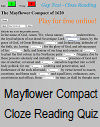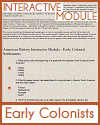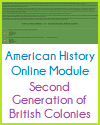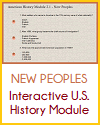Unit II: Colonial Period Learning Games |
|---|
| www.studenthandouts.com > U.S. History > Colonial Period > Learning Games |
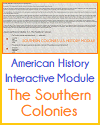 | 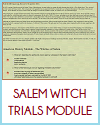 | 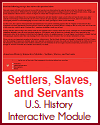 | ||||||||
| Interactive Module - The Southern Colonies | Salem Witch Trials Interactive Module | Settlers, Slaves, and Servants Interactive Module |
|
Educational games can offer several benefits to American History students learning about the colonial period.
Engagement and Motivation: Educational games are inherently engaging and can capture students' interest in the subject matter. They make learning fun and memorable by immersing students in the challenges and experiences of the colonial period. Active Learning: Games encourage active participation and interaction with the content. Instead of passively absorbing facts, students can actively explore the history, culture, and events of the colonial period. Contextual Understanding: Games provide a realistic and immersive context for students to explore colonial life. They can experience the challenges of early settlements, interactions with Native Americans, and the development of colonial governments. Critical Thinking: Many educational games involve decision-making, problem-solving, and strategy. In the context of the colonial period, students can make decisions related to survival, trade, diplomacy, and governance, fostering critical thinking skills. Historical Empathy: Games can help students empathize with the people who lived during the colonial period. By stepping into the shoes of early settlers, indigenous people, or colonial leaders, students gain a deeper understanding of the historical context. Role-Playing: Educational games often include role-playing elements, allowing students to take on the roles of historical figures or individuals from different social backgrounds. This helps them appreciate the motivations and perspectives of people from various walks of life. Simulation: Simulation games can recreate historical scenarios, such as life in a Jamestown settlement or the challenges faced by early explorers. These simulations provide an authentic and interactive learning experience. Collaboration and Communication: Many educational games encourage collaboration and communication among students, mirroring the cooperative efforts required for survival and progress in the colonial period. Retention of Information: Learning through play can lead to better retention of information. Games often involve repetition and reinforcement, helping students remember key facts and concepts. Assessment: Educational games can be used for formative or summative assessment to gauge students' understanding of the material. Quizzes, puzzles, or challenges can be integrated into games for assessment purposes. Customization: Educators can customize educational games to align with specific curriculum goals and learning objectives. This flexibility allows teachers to tailor games to the topics and themes they want to emphasize. Historical Accuracy: Well-designed educational games are typically researched and developed with historical accuracy in mind. They can offer students a credible portrayal of the colonial period, helping them build a strong foundation in historical knowledge. Educational games provide a dynamic and interactive way for students to explore the colonial period. They enable students to connect with the past, analyze historical context, and develop a deeper understanding of the challenges and events that shaped early American history. |
| Colonial Period Books and Films | Colonial Period Learning and Study Games |
| Colonial Period Image Galleries | Colonial Period Outlines and PowerPoints |
| Colonial Period Miscellany | Colonial Period Worksheets |
| www.studenthandouts.com > U.S. History > Colonial Period > Learning Games |



